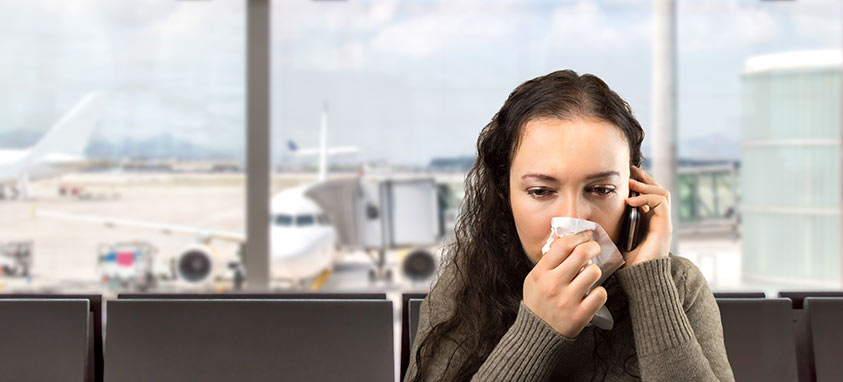As U.S. residents await the beginning of daylight saving time on March 12, longer days, warmer weather and bursting blooms are top of mind. But winter isn’t over, and neither is flu season. Though these facts may seem disappointing, they provide an important reminder—especially for anyone taking to the air for spring break, off-season trips or business travel.
Already, the 2016-2017 flu season has seen flu hospitalization, pneumonia and mortality rates in the United States outpace last winter’s numbers. The current flu season hit its peak in the early days of March, meaning that while the worst of winter may have passed, the danger of contracting the flu is still very present. In fact, flu season can extend into May.
So what can travelers do to stave off illness during flu season’s last gasp? AIG Travel Global Medical Director Dr. William Spangler offers tips to help you stay healthy.
Get vaccinated
The first, best defense against the flu is to get an annual flu vaccine, according to the Centers for Disease Control (CDC). Yet, WebMD reported in mid-December that fewer than 40 percent of Americans had done so. If you’re among the majority of unvaccinated Americans, there’s still time to protect yourself. The CDC recommends that everyone 6 months and older get vaccinated by the end of October, but late is better than never.
Take common-sense precautions
There are many strains of the flu, but the vaccine protects only against those expected to be most common in the current year. And while the vaccine does greatly reduce the risk of infection by those strains, it cannot completely eliminate it. Simple preventive measures such as hand washing and avoiding contact with visibly sick people should be standard operating procedure during flu season. When flying, use disinfecting wipes to sanitize tray tables and arm rests.
Keep your destination in mind
International travelers, take note: The Southern Hemisphere’s flu season kicks off just as the Northern Hemisphere’s winds down. To stay informed and prepared, check for health alerts pertaining to your destination. Both the CDC and the U.S. Department of State offer extensive online resources. And don’t assume that the flu vaccine you got at home will protect you abroad. The standard vaccine administered in the U.S. only addresses the season’s most common strains in this country.
If you’re sick, stay grounded
We know: You have places to go. Whether you’re traveling for work or vacation, you invested energy, planning and anticipation in preparing for the trip. But if departure day finds you suffering from body aches, a cough, sore throat and runny nose, it’s best to hunker down at home. And forget flying with a fever. Instead, postpone or cancel the trip to allow yourself time to heal and to avoid infecting healthy passengers.




